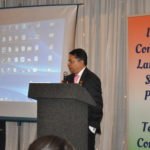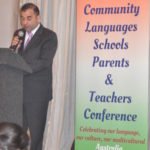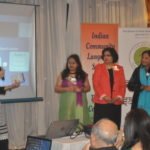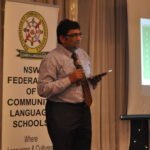Mr. Thiru Thirunanthakumar in his session about reporting management highlighted the need for consistent, progress update involving the parents and the need for positive feedback which would enthuse students. “A student MUST never fail in language”, he emphasised to the teachers and also signified that regular positive feedback to children keeps them engaged in learning the community language.
“Use of fun activities to teach language in a cultural context” was facilitated by Dr. Meenakshi Srinivasan and faculty of Sydney Sanskrit School. The workshop demonstrated language learning related fun activities that accentuated the use of four ‘I’s – Inspiration, Inclusion, Impression and Innovation, a unique methodology adopted by the school. Teachers thoroughly enjoyed the hands on activities and found the workshop very useful. They noted the simple fun activities such creation of song, rhyme and or as simple as making a cultural activity based theme card in the community language was in line with the mainstream language learning experience of a child.
Mrs. Lakshmi Sekhar led a session on “Language learning with focus on task based activities” shared her valuable experience in the education sector as an English teacher to part time volunteer teachers in community language schools. Emphasizing on the six key- strategies, making connections, predicting, monitoring, visualising, questioning and summarizing, Lakshmi quoted that “Language learning has to be fun; Learning language helps broaden kids’ view of the world and it helps to speak, read, write, listen and think in another way”,
“Identify task based activities that bridge the gap between community language learning at school and home” was facilitated by Smt Mala Mehta OAM and faculty of IABBV Hindi School. The workshop gave practical suggestions through various presentations on synergising community language learning at home and at school in the Australian environment.
“Current approaches to teaching an Indian language” was also presented by Mr. Nitin Gore and Mansi Kanitkar – Marathi and Mr. Mallik Rachakonda -Telugu teachers. All the presentations amplified the need for sharing ideas to address the common issues in teaching a community language.










